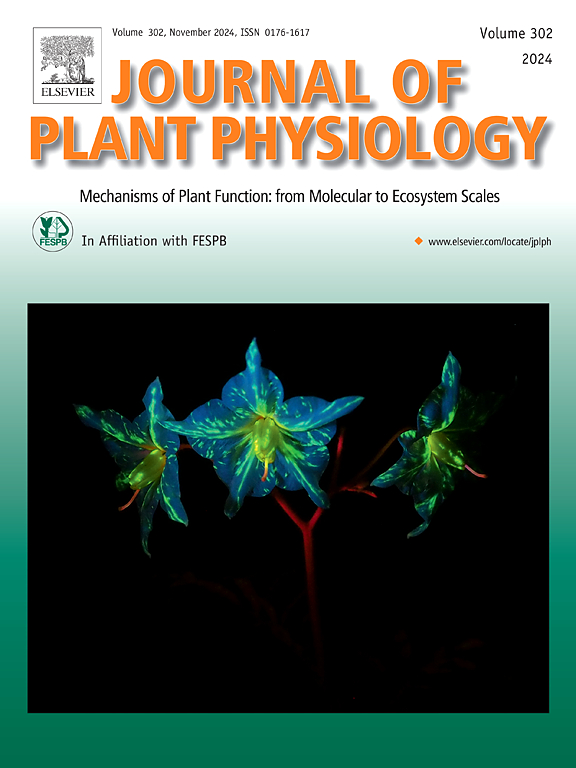水杨酸甲酯诱导'Nam Dok Mai'芒果中的内源性茉莉酸和水杨酸,以保持采后成熟和品质
IF 4
3区 生物学
Q1 PLANT SCIENCES
引用次数: 0
摘要
水杨酸(SA)和茉莉酸(JA)是不可或缺的植物激素,它们之间的相互作用影响着植物的成熟过程。水杨酸甲酯(MeSA)和茉莉酸甲酯(MeJA)被用来提高园艺产品收获后的内源 SA 和 JA 水平。然而,它们保存芒果的能力尚不确定。本研究调查了外源 MeSA 和 MeJA 对芒果成熟质量的单独和联合影响。在 25 °C 和 80-85% 相对湿度(RH)条件下贮藏 6 天之前,用 MeSA、MeJA 和 MeSA 加 MeJA(MeSAJA)熏蒸'Nam Dok Mai'芒果。对果实的成熟属性、呼吸速率、乙烯(ET)产量、总酚(TP)和丙二醛(MDA)进行了评估。测定了内源 SA 和 JA 水平、脂氧合酶(LOX)和苯丙氨酸氨化酶(PAL)的活性以及相关基因 MiPAL、MiICS 和 MiLOX 的表达。单独施用 MeSA 或 MeJA 可降低 ET 产量、呼吸速率和 MDA 水平,同时在处理后不久提高 TP,从而保持芒果的品质。成熟质量反映了诱导的 SA 和 JA 水平,并与生物合成相关基因(MiPAL、MiICS 和 MiLOX)的高表达相关。单独处理会刺激 SA 和 JA 的生物合成,这表明这些植物激素在功能上是相互关联和相互依存的。与单个处理相比,MeSAJA 组合会产生权衡反应和不同的表型结果。因此,MeSA熏蒸是一种在收获后保持芒果品质的实用方法。本文章由计算机程序翻译,如有差异,请以英文原文为准。
Methyl salicylate induces endogenous jasmonic acid and salicylic acid in 'Nam Dok Mai' mango to maintain postharvest ripening and quality
Salicylic acid (SA) and jasmonic acid (JA) are indispensable phytohormones whose interaction influences the ripening process in plants. Methyl salicylate (MeSA) and methyl jasmonate (MeJA) have been utilized to elevate the endogenous levels of SA and JA in horticultural products after harvest. However, their ability to preserve mango is uncertain. Individually and combined effects of exogenous MeSA and MeJA on mango ripening quality were investigated. 'Nam Dok Mai' mangoes were fumigated with MeSA, MeJA, and MeSA plus MeJA (MeSAJA) prior to storage for 6 d at 25 °C and 80–85% relative humidity (RH). Fruit ripening attributes, respiration rate, ethylene (ET) production, total phenolics (TP), and malondialdehyde (MDA) were assessed. Endogenous SA and JA levels were measured, as were the activities of lipoxygenase (LOX) and phenylalanine ammonia-lyase (PAL), and the expression of related genes MiPAL, MiICS, and MiLOX. Individual application of MeSA or MeJA preserved the mango quality by reducing ET production, respiration rate, and MDA levels while raising TP shortly after treatment. The ripening quality mirrored the induced SA and JA levels and correlated with the high expression of biosynthetic-related genes (MiPAL, MiICS, and MiLOX). Individual treatments stimulated SA and JA biosynthesis, demonstrating that these phytohormones are functionally connected and interdependent. When combined, MeSAJA caused a tradeoff response and distinct phenotypic outcomes compared to the individual treatments. As a result, MeSA fumigation is a practical method for preserving mango quality after harvest.
求助全文
通过发布文献求助,成功后即可免费获取论文全文。
去求助
来源期刊

Journal of plant physiology
生物-植物科学
CiteScore
7.20
自引率
4.70%
发文量
196
审稿时长
32 days
期刊介绍:
The Journal of Plant Physiology is a broad-spectrum journal that welcomes high-quality submissions in all major areas of plant physiology, including plant biochemistry, functional biotechnology, computational and synthetic plant biology, growth and development, photosynthesis and respiration, transport and translocation, plant-microbe interactions, biotic and abiotic stress. Studies are welcome at all levels of integration ranging from molecules and cells to organisms and their environments and are expected to use state-of-the-art methodologies. Pure gene expression studies are not within the focus of our journal. To be considered for publication, papers must significantly contribute to the mechanistic understanding of physiological processes, and not be merely descriptive, or confirmatory of previous results. We encourage the submission of papers that explore the physiology of non-model as well as accepted model species and those that bridge basic and applied research. For instance, studies on agricultural plants that show new physiological mechanisms to improve agricultural efficiency are welcome. Studies performed under uncontrolled situations (e.g. field conditions) not providing mechanistic insight will not be considered for publication.
The Journal of Plant Physiology publishes several types of articles: Original Research Articles, Reviews, Perspectives Articles, and Short Communications. Reviews and Perspectives will be solicited by the Editors; unsolicited reviews are also welcome but only from authors with a strong track record in the field of the review. Original research papers comprise the majority of published contributions.
 求助内容:
求助内容: 应助结果提醒方式:
应助结果提醒方式:


